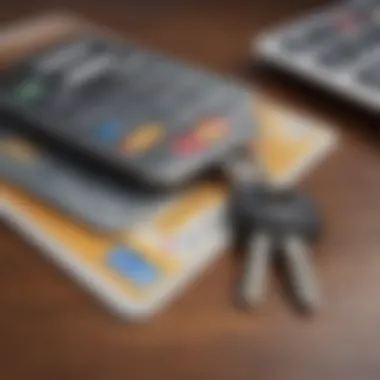Using a Credit Card for Car Down Payments: What You Need to Know


Intro
Navigating the complex world of car purchasing can be as tricky as threading a needle blindfolded. One vital aspect that often raises eyebrows is the potential to use a credit card for making a down payment on your vehicle. At first glance, it might seem like a neat trick to chip away at that initial cost—who wouldn’t want to stack some credit card rewards or points? Yet, the implications of such a move are far from straightforward. This guide aims to peel back the layers and delve into the nuances of this financing method.
Before diving into the nitty-gritty, it’s crucial to outline the purpose of this discussion. Understanding the benefits and downsides of utilizing a credit card in this context not only equips buyers with the know-how but can also illuminate paths that might otherwise remain hidden. After all, navigating the finance landscape is much like sailing through turbulent seas; being well-prepared can mean the difference between smooth sailing and hitting the iceberg.
So, let’s cut to the chase and break down the relevant terms, delve into the strategies, and weigh the pros and cons. By the end of this article, you’ll have the necessary acumen to make informed decisions as you chart your course in the car buying experience.
Investment Terminology Breakdown
Understanding key concepts can significantly influence financial decisions. Here, we will break down some crucial terms that are relevant to using a credit card for a car down payment.
Key Terms Explained
- Down Payment: A down payment is the initial amount you pay upfront when purchasing a vehicle, reducing the total loan amount.
- Credit Utilization Ratio: This is the percentage of your available credit that you’re currently using; staying below 30% is usually recommended for maintaining a healthy credit score.
- Annual Percentage Rate (APR): This represents the total costs of borrowing, expressed as a yearly interest rate, which can affect overall loan costs significantly.
- Rewards Points: These are perks that come from credit card use, allowing users to earn points that can be redeemed for various benefits, such as cash back or travel discounts.
Common Misconceptions in Investing
Misunderstanding certain aspects of credit usage can lead to decisions that may not align with personal financial objectives.
- Using Credit Cards Will Always Boost Your Credit Score: This idea can be misleading. While responsible usage may help, late payments and high utilization can damage your score instead.
- Rewards Always Offset Costs: Many overlook the potential interest accrued if the balance isn't paid in full, which can quickly outweigh the benefits of any rewards earned.
Understanding the Implications
Using a credit card as a down payment method can have far-reaching impacts, both beneficial and detrimental. Therefore, it's essential to evaluate your financial landscape before embarking on this approach.
Prolusion to Down Payments
Understanding down payments is fundamental when considering various financing options for buying a car. What are they really? In simple terms, a down payment is the initial amount paid when purchasing a vehicle, reducing the total amount financed. This upfront cash injection not only signifies a commitment to the purchase but also helps you manage the loan terms more favorably.
A key benefit is that making a substantial down payment can lower your monthly payments and the overall interest paid over the lifespan of the loan. So, for someone looking to stretch their dollar, this concept becomes all the more significant. However, this guide specifically brings attention to one unconventional method: using a credit card to fund the down payment.
With the proliferation of credit and the varying terms attached to modern credit cards, navigating this terrain requires diligence. It’s not just about swiping a plastic card; it's about making a strategic financial decision. Hence, this article aims to delve into the nuances of down payments, especially in the context of car purchases.
Understanding these aspects allows potential buyers to grasp how a down payment impacts not only their immediate finances but also their long-run economic stability. After all, a misstep in financial strategy can lead to unexpected challenges later down the road.
Defining Down Payments in Vehicle Purchases
When you’re eyeing that shiny new car, what you might not realize is that the term down payment carries with it a wealth of implications. At the core, a down payment is a portion of the purchase price you pay upfront. It’s a straightforward concept, yet crucial to grasp as it directly influences the financing agreement you enter into.
For instance, if you are purchasing a car priced at $20,000 and decide to put down $4,000, you would then be financing $16,000. This approach not only reduces the amount you need to borrow but also demonstrates to lenders that you’re invested in the transaction.
Typically, many consider a down payment of at least 20% as ideal; though it’s not a hard and fast rule. Nevertheless, higher down payments generally yield better loan terms due to a lower risk for lenders.
The Significance of Down Payments
Down payments play a pivotal role in the financial landscape of vehicle purchases. They affect a myriad of aspects, like loan approval chances, interest rates, and monthly installments. Consider this: Making a larger down payment might reduce the loan-to-value ratio (LTV), which is significant for lenders assessing your creditworthiness. A solid down payment can enhance your chances of securing a loan at a lower interest rate.
Moreover, the significance of a down payment extends beyond the immediate purchase. It's also a way to mitigate risks, particularly in situations like depreciation. Cars lose value quickly, and having a down payment helps you avoid being upside down on the loan, a scenario where you owe more than the car is worth.
In essence, down payments represent both a commitment to the purchase and a tactical maneuver in securing a better financial deal. They matter, both now and in the futures of your financial health.
Understanding Credit Cards
Understanding credit cards is crucial for anyone considering leveraging them for a down payment on a car, as it allows potential buyers to navigate the financial landscape effectively. Not only does it provide insight into the mechanics of credit, but it also highlights the possibilities and pitfalls associated with their use in significant purchases like vehicles. Credit cards can serve as a tool for immediate financing, rewards accumulation, and even managing cash flow, but failing to understand their proper utilization can lead to unforeseen financial stress.


Types of Credit Cards
When venturing into the realm of credit cards, it’s essential to know that they come in numerous varieties, each tailored to specific financial needs.
- Rewards Cards: These cards offer points or cash back for every dollar spent, making them an attractive option for those who anticipate using a substantial amount of credit for their down payment.
- 0% APR Introductory Cards: This type allows users to carry a balance without accruing interest for a limited time, providing a potential buffer while financing a car purchase.
- Secured Credit Cards: Particularly useful for individuals with a limited credit history, these require a cash deposit but can help build credit over time, enhancing one's profile for larger loans in the future.
- Business Credit Cards: Although geared towards professionals, they can sometimes provide higher limits and rewards tailored for business transactions.
Each of these card types can play a role in deciding how to approach a vehicle down payment. However, choosing one without thorough consideration could backfire in ways that could affect a buyer's financial situation more than they might expect.
Credit Card Terms and Conditions
Before signing up for a credit card as part of your strategy for making a down payment, it’s imperative to scrutinize the associated terms and conditions. These can often be dense, full of legalese, but it’s worth the effort to dissect them for key elements that significantly impact your financial health:
- Interest Rates (APR): This is the annual percentage rate that will determine how much interest you'll pay on any balance not paid off within the billing cycles.
- Credit Limit: Understanding the maximum amount you can borrow on your card is vital. Many dealers will have restrictions on the amount they will allow you to use towards a down payment.
- Fees: Look out for annual fees, late payment fees, or transaction fees, especially if you're considering using the card for an amount approaching the limit.
- Rewards Program: Delve into how rewards are earned and redeemed. Paying attention to the fine prints can sometimes reveal better options for maximization.
In summary, getting a handle on these elements not only fortifies your understanding but also empowers you to make sound financial decisions when the time comes to seal the deal on that new vehicle.
To successfully navigate your car purchase, knowledge about the right credit cards and their conditions isn’t just beneficial; it's necessary!
The Feasibility of Using a Credit Card for Down Payments
When it comes to purchasing a vehicle, the down payment is a crucial element. It not only signifies your commitment to the deal but also influences your financing terms. So, can you use a credit card for this initial payment? The feasibility of utilizing a credit card for a down payment requires a close examination of industry practices and potential obstacles. Let's explore this topic in detail to give potential buyers a well-rounded understanding of their options.
Common Practices in the Automotive Industry
The practice of accepting credit cards for down payments varies significantly among dealerships. While some businesses are open to the idea, others cling to traditional methods. Here's how it typically shakes out:
- Dealership Policies: Many dealerships do allow credit card payments up to a certain limit. This is often due to transaction fees, which can eat into the dealership's profits. Larger payments may need to be covered through other means.
- Standard Practices: In general, vehicle dealerships prefer cash or bank drafts for down payments. They see these as more secure and immediate than credit card transactions, which might involve delays as the payment processes.
- Consumer Advantage: Using a credit card for a down payment can be an attractive option if you’re trying to rack up rewards or points. Some buyers find this helps in managing cash flow, especially if they are waiting for other funds to come through.
Potential Limitations from Dealerships
However, while the idea of using a credit card may appeal to budget-savvy consumers, it isn't without its pitfalls. Here are some limitations you may face:
- Limits on Transaction Amount: Dealerships usually set a cap on how much you can charge to your credit card. This means if you planned on making a significant down payment, you may hit a wall.
- Increased Fees: Although convenient, using a credit card often incurs additional service fees for the dealership. These fees might prompt dealerships to advise against credit card payments, or at least, make them less favorable as they pass those costs onto the consumers.
- Contractual Obligations: Some car manufacturers have specific rules about payment methods, and dealerships must adhere to them. This can further restrict the feasibility of credit card transactions for down payments.
In summary, while using a credit card for a down payment on a car presents an interesting option, it’s not universally accepted. Being aware of both common practices and potential limitations can help you navigate your purchasing decisions more wisely. As they say, knowledge is power, so go into your vehicle purchase informed.
Advantages of Using Credit Cards for Down Payments
Utilizing a credit card for making a down payment on a vehicle has become increasingly common as consumers seek ways to integrate their financial strategies. Several advantages come into play when tapping into credit for this initial cost of purchasing a vehicle. These benefits can significantly impact both the immediate and long-term financial landscape of the buyer.
Building Rewards Points
One of the primary incentives of using a credit card for a down payment is the opportunity to earn rewards points. Many credit cards offer a points system where users can earn rewards based on the amount spent. When it comes to large purchases like a car down payment, this can translate to considerable points accrued over a single transaction.
- Consumer Benefits: These points can often be redeemed for travel perks, merchandise, or cashback. Consumers can capitalize on their spending patterns, enhancing the value obtained from what would usually be a straightforward transaction.
- Strategic Use: Choosing a credit card that offers higher points for automotive purchases can amplify benefits. For instance, some cards provide double points when buying from select dealerships or during promotional periods.
Furthermore, earning rewards can create an incentive for consumers to rationalize their spending habits. It shifts the mindset from viewing credit as merely financial leverage to recognizing it’s a tool that can contribute to one’s savings in other areas. It’s worth noting, however, that potential rewards should not overshadow the fundamental responsibility of managing credit wisely.
Immediate Payment Convenience
Another important perk of making a down payment with a credit card is the immediate convenience it provides. Car sales can often come down to timing. When a buyer is ready to secure a vehicle, reducing delays through swift payment can be a tactical advantage.
- Quick Transactions: Unlike bank wires or checks, which require verification and processing time, credit card transactions are completed almost instantly. This agility can be the deciding factor for some consumers, preventing a potential loss of the vehicle they have set their sights on.
- Budget Management: For buyers who may be stretching their budgets thin, using a credit card can provide a buffer. It allows consumers to keep cash flow intact while managing the payment over an extended period, supposing an adequate payment plan is in place. Here, a balance can be struck between sustaining cash reserves and enjoying the immediate gratification of a new vehicle.
In summary, while utilizing a credit card for a down payment can come with its own set of considerations, the advantages—ranging from rewards accumulation to immediate payment efficiency—highlight the potential benefits. When approached thoughtfully, it can undoubtedly serve as a strategic financial move.
Disadvantages of This Financing Approach


Utilizing a credit card for a down payment on a car can seem like an attractive option at first glance, but it comes with its fair share of drawbacks. This section explores crucial disadvantages that potential buyers should consider when thinking of this financing method. It's not just about the immediate benefits but also the long-term implications that can affect one's financial well-being.
High Interest Rates on Credit Cards
When it comes to credit cards, high interest rates are the elephant in the room. Most credit cards carry interest rates that can easily exceed 15% or even 20%. This becomes a stark reality when you’re using a card to make a significant payment like a down payment on a vehicle.
- Immediate Debt Accumulation: If the full down payment isn’t paid off quickly, you can find yourself in a slippery slope of escalating debt. The interest starts piling up, and before you know it, the cost of that down payment surpasses the initial purchase price of the vehicle. It's like digging a hole and wondering why the walls keep closing in.
- Budget Strain: High interest can also lead to a considerable strain on your monthly budget. If you're juggling bills and repayment schedules, the last thing you want is additional pressure from credit card payments. Every month becomes a waiting game, hoping you can scrape together enough to keep the wolves at bay.
Impact on Credit Utilization Ratio
The credit utilization ratio is a term that many may overlook, yet it's crucial in the realm of credit management. This ratio compares your current credit card balances to your total available credit. Using a credit card for a down payment might cause this ratio to spike.
- Potential Credit Score Impact: When the balance on your credit card increases significantly, it can negatively affect your credit score, which is the last thing you want when looking to make another large purchase in the future – like that dream home. A higher utilization ratio signals risk to potential lenders, possibly leading them to view you as a higher-risk borrower.
- Long-Term Financial Consequences: Just like a stone tossed into a pond, the ripples of your credit decisions spread far and wide. A poor credit score can make future financing options either more expensive or unavailable altogether. This underlines the importance of understanding how short-term choices can have long-lasting effects on your financial health.
When weighing the option of using a credit card for a down payment, it’s crucial to evaluate these disadvantages seriously. The road may be littered with charming shortcuts, but they're best avoided if they lead to deeper issues down the line. To make a fully informed decision, consider alternate financing methods that could potentially save you money and protect your credit standing.
"A penny saved is a penny earned" when it comes to avoiding debt pitfalls.
In summary, the disadvantages of using a credit card for a down payment can impact both your wallet and your credit standing for years to come. Understanding these risks is vital to ensuring that your car purchase doesn’t turn into an expensive financial lesson.
Strategies for Using a Credit Card Effectively
When it comes to utilizing a credit card for a down payment on a car, one must tread carefully. This section aims to shed light on practical strategies that can make the process smoother and more beneficial. Knowing how to handle credit card usage wisely can set the stage for a favorable car buying experience.
Choosing the Right Credit Card
Selecting the right credit card is akin to finding the right tool for a job. Not all credit cards are created equal. It's necessary to look for a card that offers the best benefits for your situation.
Some elements to consider include:
- Interest Rates: Look for cards with lower interest rates if you plan to carry a balance. A high rate can eat away at any rewards you might earn.
- Rewards Programs: Some cards offer cash back or travel points, which can be incredibly useful. If you're looking to maximize your spending power, rewards can translate to significant savings over time.
- Credit Limits: Ensure the card has a sufficient limit to cover your down payment. It would be quite a pickle to find your limit falls short right when you need it.
In essence, your choice of card can significantly influence your financial outcome in this transaction. Using a credit card with a robust rewards program may reap benefits that could be used toward future car expenses.
Managing Payment Plans
Using a credit card wisely involves not just the right selection but also how you manage payments afterward. A laid-out plan can mean the difference between a burden and a manageable expense.
It’s important to think about the following:
- Paying on Time: Late payments can incur hefty fees and affect your credit score. Set up reminders or automatic payments to keep everything on track.
- Paying More Than the Minimum: Don’t just stick to the minimum payment. If you can, pay more to reduce your debt faster and save on interest in the long run.
- Creating a Budget: Factor in the credit card payments into your monthly budget. This helps ensure it won’t throw your finances out of whack.
"A stitch in time saves nine." Taking the time to manage your payment plan can save you a whole lot of trouble down the road.
Effective management and strategic planning around credit card use ensures that financing a down payment can fit into your larger financial picture.
Overall, the journey of utilizing a credit card for a car down payment can prove valuable if approached correctly. Understanding which card to use and how to manage payments can set you on a path to financial stability while enjoying your new vehicle.
Comparing Alternatives for Financing Down Payments
When it comes to making a down payment on a vehicle, evaluating your options is crucial. Not every financial method suits every person, and the stakes are especially high with car purchases. Understanding alternatives can help individuals navigate the complex landscape of financing, ensuring choices align not just with immediate needs but also long-term financial health.
Exploring various financing options empowers buyers by showcasing benefits and potential drawbacks. This way, one can make an informed decision that fits their unique situation.
Loans from Financial Institutions


When considering loans from financial institutions, it’s vital to look into several aspects. Traditional banks, credit unions, and online lenders each offer various loan products that can serve as viable alternatives for financing a down payment.
Pros of using loans from these institutions include:
- Competitive Interest Rates: Many financial institutions offer rates lower than credit card rates, which can save you a heap over time.
- Fixed Payments: Loans typically come with predetermined payment amounts, making financial planning easier.
- Flexible Terms: You can find loans with various repayment durations, letting you choose what fits your budget best.
However, it's also necessary to keep in mind some considerations:
- Approval Process: Obtaining a loan may require a solid credit score and a fair amount of paperwork.
- Possible Fees: Some loans have fees that can add to the overall cost, so always read the fine print.
Being thorough in reviewing different institutions can be the difference between a good deal and a middling one. Remember, laying a solid financial foundation now prevents headaches in the future.
Personal Savings and Effective Budgeting
In times of financial uncertainty, dipping into personal savings can be a smart choice for making a down payment. Using saved funds eliminates the worry of accruing debt and makes for a straightforward transaction.
Advantages of using personal savings include:
- No Interest Payments: When you pay with savings, you avoid the pesky interest that accompanies loans or credit cards.
- Financial Freedom: You're not tethered to a repayment schedule, allowing flexibility in your budget down the line.
- Stronger Negotiating Position: Sellers may view a cash purchase more favorably, potentially enabling better deals.
Nevertheless, it’s essential to evaluate the implications of using personal savings:
- Depleting Savings: Make sure that utilizing a chunk of your savings doesn’t compromise your emergency fund or other savings goals.
- Opportunity Cost: By using your hard-earned cash for a down payment, consider what other investments or financial moves might get sidelined.
In essence, effective budgeting and having a savings strategy can make all the difference in managing finances successfully. By scrutinizing the alternatives to using a credit card for your down payment, you not only enhance your options but also ensure your decisions contribute positively to your financial landscape going forward.
Assessing the Impact on Your Financial Health
When considering the use of a credit card for a down payment on a vehicle, it is critical to look closely at how this action affects your overall financial health. Not simply because it involves lines of credit and potential savings, but due to a myriad of factors that intertwine personal finance and the expenditures associated with car ownership. Understanding these implications can help avoid nasty surprises down the road, ensuring that any immediate financial moves align well with longer-term goals.
Monitoring Credit Scores Post-Purchase
One of the first things to consider is how this financing option could influence your credit score. When you make a substantial purchase with a credit card—like a down payment on a car—it can initially spike your credit utilization ratio. This ratio is calculated using the total credit you are using divided by your total credit limit. If your card has a limit of $5,000 and you use $2,500 for the down payment, your utilization ratio jumps to 50%. Such high usage can be a red flag, potentially causing a dip in your score in the short run.
"A high credit utilization rate is often seen as a signal of risk to lenders, which can lead to higher interest rates on future loans."
However, if you can manage your card responsibly after the purchase—by paying down the balance quickly—your credit score might recover and even improve. Timely payments can help mitigate the initial negative impact of the down payment. Keeping this cycle in mind is vital when gauging whether using a credit card for your down payment is indeed a smart move for your credit profile.
Evaluating Long-term Financial Implications
Looking beyond the immediate effects, one should not overlook the broader financial implications that may arise from using credit for a down payment. The potential for accruing high-interest debt cannot be taken lightly. It’s essential to ask yourself whether the added expense of interest payments can fit neatly within your budget. You might end up paying more for a car in the long run if you're not careful.
Additionally, you should consider how this decision fits into your overall financial strategy. Are you prioritizing short-term convenience over long-term financial stability? If you've managed to secure a good interest rate or favorable terms on a car loan, draining a credit card for the down payment might not be necessary. Sometimes, building up savings for an adequate down payment can translate into better offers from lenders when the time comes to finance.
In essence, being thorough with your assessment allows you to make more grounded decisions, ensuring you’re not just thinking about the immediate benefits but also projecting how this financial decision impacts your situation months or even years down the line. By keeping a firm grip on your financial health, filtering through immediate gratification, and ensuring long-term planning, you can set yourself up for success in your new vehicle purchase—and beyond.
Closure: Making an Informed Decision
When considering using a credit card for a down payment on a car, it’s crucial to take a step back and reflect on the broader implications of this choice. This article has shed light on various angles of this topic, from the advantages of point accumulation through credit cards to the potential pitfalls of high interest rates. Paying attention to these elements can help buyers navigate the often murky waters of automotive financing.
An informed decision is not just about the immediate benefits or eye-catching rewards; it’s about understanding how this financing method aligns with your overall financial health and future plans. A credit card can offer convenience and rewards, but it can also lead to significant debt if not managed wisely.
Key Takeaways
- Reward Potential: Utilizing a credit card can accumulate rewards points that might be beneficial in the long run. However, always check if the reward structure fits your spending habits.
- Impact on Credit Score: Using a credit card for large purchases can raise your credit utilization ratio, potentially impacting your credit score negatively.
- Interest Rates: Be wary of high interest rates; assess if you can pay off your balance quickly to avoid falling into debt.
- Alternatives Exist: Consider evaluating other financing options available, such as personal loans or savings.
It’s essential for the potential car buyer to evaluate these factors before making a final decision. A balanced approach—taking into account both the advantages and disadvantages—will serve to align your choice with your financial goals.
Final Considerations for Buyers
As you approach the decision-making process, here are some points to ponder:
- Evaluate Your Financial Situation: Assess your total debt and income to determine if this approach is feasible for you. If funds are tight, it might be wise to reconsider using a credit card for a down payment.
- Research Dealership Policies: Not all dealerships accept credit cards for down payments. It’s crucial to confirm beforehand to avoid surprises.
- Long-term Perspective: Think beyond the immediate transaction. What impact will your choice have on your credit standing over the months or years?
- Stay Informed: Follow reputable financial resources for the latest insights and trends in auto financing.















